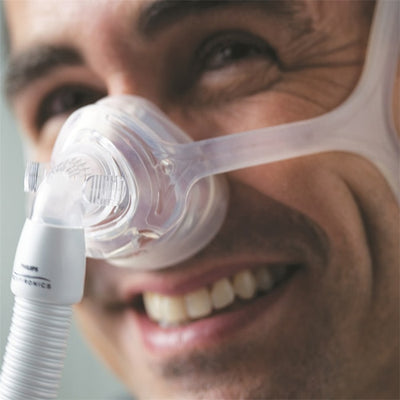One of the most important parts of sleep apnea therapy is ensuring that you have a quality mask. The right mask will deliver a steady flow of pressurized air without leaking or causing significant discomfort. With a properly fitted mask and CPAP machine working together, you can prevent sleep apnea episodes that wake you up during the night.
There are three main types of masks: full face masks that cover the nose and mouth, nasal masks that cover the nose, and nasal pillow systems that are inserted into the nostrils.
Understanding which type of mask will work best for your needs is reliant on three main factors. Here is what you should consider when trying to decide which mask will be the best fit for your sleep apnea therapy.
1. Breathing & Comfort Preferences

For example, if you breathe through your mouth while asleep, a full face mask is an absolute must. No other mask covers the mouth to ensure you get pressurized air from your CPAP machine regardless of how you are breathing. Nasal masks and nasal pillows work well for those who breathe through their nose and keep their mouth closed during sleep.
Of course, another consideration is whether a large mask makes you feel claustrophobic or interferes with other bedtime activities. Some people don’t like wearing a bulky full face mask. Small nasal pillows are much less likely to evoke this feeling since they cover less of the face.
Nasal masks and nasal pillows are also a preferred choice for people who like to read or watch TV in bed before they fall asleep. The smaller size ensures that these masks won’t interfere with your field of vision, so you can start using your CPAP machine before going to sleep.
2. Sleep Position

Sleep position has been found to affect the prevalence of sleep apnea episodes, with people more likely to experience a breathing disturbance when sleeping on their back. Despite this, sleeping on your back tends to be best for CPAP masks. Regardless of whether you wear a full face mask, nasal mask, or nasal pillows, they are unlikely to get dislodged while in this sleep position.
For side sleepers, nasal pillows and nasal masks are usually recommended over full face masks. However, a full face mask with a more minimalist design could work well. The key is ensuring that the side of the mask that will be resting against the pillow doesn’t get dislodged. Nasal pillows typically have no trouble maintaining their seal in this position. For larger nasal masks and full face masks, use a soft adjustable headgear to help keep the mask in place.
If you are a stomach sleeper, nasal pillows are going to be the easiest to use, if they are an option for you. This is because they won’t press against your face or neck, and should still be able to stay in place. If you need to wear a different type of mask, you may need to use a specialty pillow to keep the mask from leaking or pressing uncomfortably into your face.
Of course, many people roll around in their sleep and switch positions throughout the night. A mask with tubing that goes over the top of the head may be less likely to come loose for active sleepers. Ask your doctor for additional insights.
3. Size

Mask sizing is another important factor. A mask that matches your face shape and measurements will help you achieve a comfortable fit. While there is no universal standard for CPAP mask sizes, most manufacturers offer a sizing gauge to help you measure your face to get your sizing options for their masks.
For CPAP mask sizing, you need to know the length from the bridge to the base of your nose, the width of your nose at the base and bridge, the distance between the eyes, and the size of your upper lip.
Depending on the manufacturer, you may be able to choose from a few different mask sizes, or you can use different cushion sizes to achieve the right fit for your face size. A mask that is too small or large will be more prone to air leaks or causing skin irritation.
Some facial features, such as a narrow nose bridge or significant facial hair, can keep full face masks or nasal masks from forming an airtight seal against the face. You may need to get a specially fitted mask or use nasal pillows to prevent leaks. Regardless of the mask you get, adjusting the straps after putting on the mask should ultimately result in a comfortable, but airtight fit.
Sleep Better With the Right Fit
By purchasing the right CPAP mask for your needs, you can avoid treatment issues like air leaks or facial sores. You will enjoy effective therapy that helps you sleep soundly through the night. If you’re not sure what mask would be best for your needs, or are having trouble adjusting to your current mask, consult with your sleep doctor.
Of course, the cost of a CPAP mask (especially when purchased alongside a new CPAP machine) can put a bit of stress on your budget if you don’t have health insurance coverage. This is where Help Medical Supplies can make a difference. We offer a wide variety of CPAP masks from leading manufacturers, with discounts as much as $80 off of MSRP. Free shipping on orders $89 and up helps you save even more.
By pairing the right mask with your CPAP machine, the quality sleep you need is well within reach.

